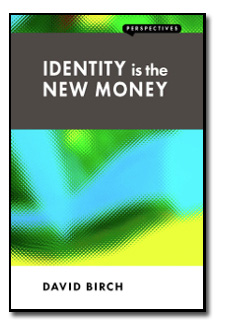Identity is the New Money, book review: Time to cash out?


Fifty years ago, a traveller planning a trip to Australia would carefully estimate how much money they needed to pay for necessities en route and buy traveller's cheques for that amount, plus some extra for contingencies. A hundred and fifty years ago, that traveller might instead have applied for a letter of credit introducing them to their bank's foreign counterpart, which would supply them with funds. The modern traveller doesn't even think about cash until arrival, when they find an ATM that spits out local cash whose equivalent is withdrawn instantaneously from their bank account back home. The ultra-modern traveller rambles the world cashless, paying for everything via one of his plastic cards or by tapping his mobile phone. That man is Dave Birch, and he's waiting eagerly for the phone to swallow the plastic cards.
In Identity is the New Money, Birch, a founding director of the specialist consultancy Consult Hyperion, lays out the extraordinary change in how we think about both identity and money that new technologies — especially mobile phones — are making possible.
But first to define terms. Money is a medium of exchange, a repository of stored value, and a system for keeping score — more formally, a unit of account. Money is not, or not only, any of the things it's commonly confused with: currency, or coins and bills. Currency is how the two parties to a transaction have chosen to denominate value. Coinage gives the vendor payment he can trust without having to trust you. Money in its current manifestation is broken, Birch says, because the system we have in place, while suited to the industrial era, is a poor fit for today's needs and opportunities.
Money changes approximately once a generation, says Birch, and we are due for a change.
Identity is a similarly complex range of ideas. You may not think of a credit card as an expression of identity, but like the old letter of credit it guarantees the vendor will get paid. Go back to when most people lived in villages where everyone knew them, and their faces were their credential (this still works in parts of modern London). Identity isn't cash in any of these situations, but it guarantees payment.
Birch argues that in modern Britain identity is also broken. He cites as an example the difficulties of opening a bank account under the anti-money-laundering 'Know Your Customer' rules: the range of acceptable proofs is limited, and has little to do with common sense, which the bank is not legally allowed to apply. Why not instead build upon the social graphs everyone is building instead? In such a world, cash is no longer needed, and thousands of 'currencies' can bloom: what does it matter whether his phone transfers pounds, frequent flyer miles, or Dave dollars as long as the vendor agrees?
Birch's ideas are always interesting and thought-provoking, whether or not you share his hatred of cash (in his view, bulky, expensive to produce, transport, and guard, and in large denominations useless except for enabling criminals). Soon, he believes, it will be gone, replaced by the fairer, more efficient alternatives discussed above. Money changes approximately once a generation, says Birch, and we are due for a change. I'm not so sure. Cash has been with us for thousands of years. It is a medium, and media are very hard to kill.